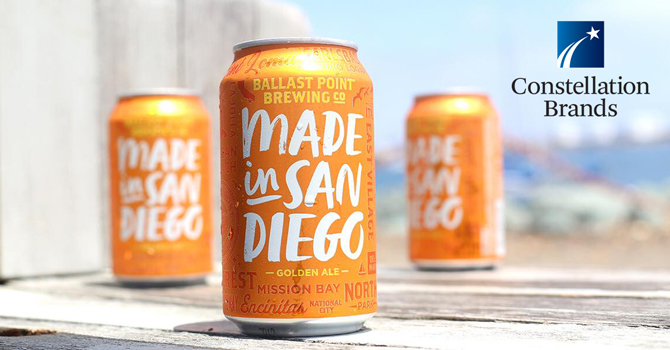
Constellation Brands reported its fiscal year and fourth quarter 2019 earnings results today, which were highlighted by a 7 percent increase in net sales, to more than $8.1 billion.
Net sales of Constellation Brands’ beer brands — including Mexican import labels Corona, Modelo and Pacifico, as well as craft breweries Ballast Point, Funky Buddha and Four Corners — increased 11.6 percent, to more than $5.2 billion. Beer shipment volumes and depletions grew 9.7 percent and 8.8 percent, respectively.
During a call with analysts and investors, Constellation president and CEO Bill Newlands said Constellation’s beer business accounted for 40 percent of “high-end” beer category growth and 100 percent of import segment growth last year.
During the 2019 fiscal year, Corona brand family shipments reached 150 million cases, while depletions increased 7 percent. Meanwhile, Modelo brand family shipments exceeded 125 million cases, as depletions rose 12 percent.
Newlands called Modelo Especial “the leading growth engine in entire U.S. beer market,” adding that it is the “fastest growing brand in the on-premise” and the No. 1 selling beer in 7-Eleven stores.
“It is the fastest growing major beer in the industry, accounting for almost 40 percent of total category growth,” he said, adding that the beer is now the top selling brand in California.
In 2020 fiscal year, Constellation Brands will make its “biggest marketing investment” behind Modelo, with television advertising during live sporting events as well as the roll out of 32 oz. single-serve bottles.
As for Corona, the brand family is projected to surpass Coors as the second largest beer brand family in the U.S., Newlands said. Much of Corona’s growth has been driven by Premier — a line extension that has fewer calories and carbs than namesake Corona Extra — which Newlands said was the No. 1 new brand introduction in volume and dollars last year.
To accelerate Premier’s growth — which Newlands estimated could be as much as 45 percent this year — Constellation will run a national television campaign through October and begin offering the beer in 18-packs (bottles) as well as on draft.
Constellation also has high hopes for Pacifico after the brand sold nearly 10 million cases last year, Newlands said. The brand could be a “double-digit growth driver moving forward,” he added.

The news wasn’t so good for Constellation Brand’s largest craft offering, San Diego’s Ballast Point. CFO David Klein said Constellation recorded a $108 million “impairment charge” to the brewery’s trademarks, essentially admitting it overpaid when it bought the business for $1 billion in November 2015. So the company is writing off “goodwill” associated with a brand that isn’t delivering on its investment.
Constellation previously recorded an $87 million impairment charge to Ballast Point’s trademarks in June 2017.
“While this investment has not met expectations as the craft marketplace has slowed since our acquisition, it has increased our leadership position in the high-end of U.S. beer and provided us an innovation and operating platform in the craft and specialty category to contribute to future growth,” Klein said.
Also on Thursday, Constellation Brands reported its fourth quarter earnings results, with beer sales increasing 9.3 percent, to about $1.1 billion. Beer shipments and depletions were nearly even at 8 and 8.1 percent, respectively, for the three-month period ending February 28.
Looking ahead to FY2020, Constellation Brands is projecting beer net sales and operating income growth to increase between 7 and 9 percent. Growth in FY2020 is expected to come from distribution gains and new products, Newlands said, including the Q1 national rollout of Corona Refresca, a fruit-flavored, “spiked refresher.”
Refresca — which will launch in three flavors: Guava Lime, Passionfruit Lime and Coconut Lime — is expected to attract consumers beyond the company’s core beer drinkers, Newlands added.
Constellation also plans to release a new hard seltzer brand called Wildish to attract health-conscious consumers, and expand distribution of its Western Standard barrel-aged lager brand to five states. The company will also test market a new flavored malt beverage in an effort to attract Hispanic female consumers.
Newlands said the company’s innovation strategy is to add brands that are scalable with “high-growth, high-margin potential.”
Constellation executives also discussed the sale of 30 wine and spirits brands — each priced at retail at $11 or below — to E. & J. Gallo Winery for $1.7 billion. The transaction is expected to close in Q1.
In the release, Newlands said the sale allows the company to focus on “powerhouse, high-margin, high-growth brands” wine and spirits brands.
The proceeds of the sale are earmarked to repay debt. Over the last two years, Constellation has invested $4 billion in Canadian cannabis company Canopy Growth. Newlands told analysts that the company remains confident that Canopy can achieve a $1 billion run rate in 2020.
